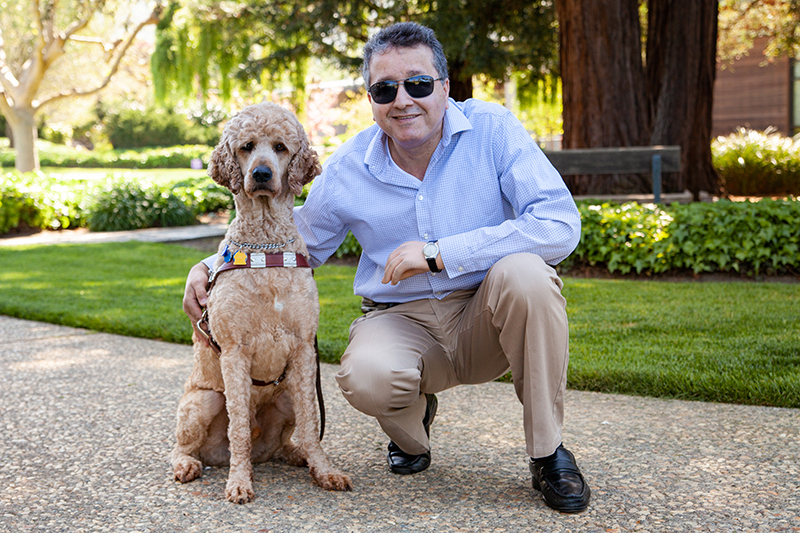Like other nonprofits, Guide Dogs for the blind (GDB), has had to pivot during COVID to carry forth our mission. GDB’s Outreach and Advocacy Department made splash this summer deploying innovative strategies to reach virtual audiences at two of the largest gatherings in the U.S. of people who are blind or visually impaired.
At the American Council of the Blind National Convention, GDB hosted a collaborative virtual panel discussion about the new federal rules when flying with a guide dog or service animal. The panel consisted of GDB and Alaska Airlines staff, accessible travel professionals, and transportation industry representatives.
“To host a panel discussion at their convention and have a national platform to reach people all over the country is such an honor,” says Rabih Dow, director of Advocacy and Outreach Programs at GDB.
COVID-19 has been especially isolating for people who are blind or visually impaired, largely because the rules and aids for socially distancing have been communicated through directional arrows, signage, or taped-off measurements that guide dogs don’t understand or white canes can’t feel. This has made air travel exponentially harder for those who are blind or visually impaired, so GDB and The Seeing Eye (TSE) organization stepped in to help improve the travel experience by creating an instructional video for airlines and airports to train their employees.
In creating the video, GDB and TSE enlisted input and participation from guide dog users, as well as from employees at Alaska Airlines, United Airlines, the Port of Oakland, the Port of Newark, and the TSA teams at Oakland International Airport and Newark Liberty International Airport. Alaska and United began sharing the video with their employees this summer.
Meanwhile, at both the American Council of the blind and National Federation of the Blind Conventions, GDB utilized innovative outreach strategies to create interactive sessions and virtual tours with our campus staff via Zoom.
“Despite the crisis of the coronavirus, these innovative virtual tours gave us a nice tool to incorporate into our outreach efforts,” explains Rabih, noting that GDB was the only organization at the conference to provide this virtual experience. “It’s unique, it’s creative and it’s groundbreaking quite frankly. Nothing like this has even happened at a convention before.”
Jake Koch, a community outreach specialist at our Oregon campus, led the groundbreaking virtual campus tours. Jake’s challenge: how to take visual mediums that everybody else is using and turn them into something that is interesting, engaging, and immersive for people who are blind or visually impaired. “We took the most important parts of what we wanted people to know such as admissions criteria, class experience, and follow-up services, and used these as talking points and then figured out what parts of campus and staff could reinforce these talking points.” Most notably, Jake points out, “We didn’t talk at people, it was a fully interactive experience where people could ask questions in real time directly to our campus experts.”
Rabih says these types of informational exchanges give prospective clients peace of mind about GDB’s training program and services. “For people who are blind or visually impaired, the thought of leaving your home to go and stay in unfamiliar surroundings by yourself can be intimidating. Being able to talk with a guide dog mobility instructor or residence hall manager to learn about our accommodations can help calm people’s concerns and help them take that step to apply for training.”
Jake says it was particularly nice for prospective clients to virtually talk with GDB staff members who they might not otherwise meet if they were attending the conference in person. “We were able to pull in a variety of staff from various departments who might not ordinarily attend these conventions to share their perspectives of working here. As an outreach tool, that was very powerful.”
While using Zoom and an iPhone to capture live video during a zoom call isn’t groundbreaking in and of itself, Jake says when you put these things together, you create a simple, highly effective live and immersive experience that allows people to get information about GDB’s programs and services in new and exciting ways.
“Our primary goal is to educate people to make an informed choice about guide dog mobility. It’s not a pre-taped seminar or a one-way sales pitch on a Zoom call. It’s interactive. We’re empowering people to say yeah, this is what I want and I’m willing to go for it and this organization is going to stand behind me and help me get there.”
Click here to learn about our guide dog program.




